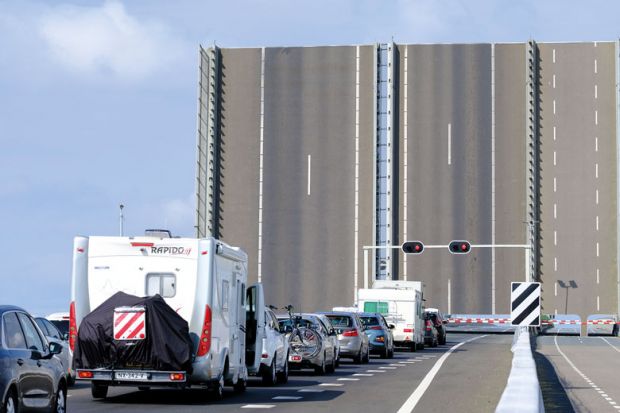Dutch universities “will be taking their own measures” to reduce international student numbers, amid mounting political pressure.
The umbrella body Universities of the Netherlands (UNL) said that while internationalisation was “of great importance”, growing overseas cohorts were leading to “challenges in some areas”, citing insufficient student accommodation and reduced “accessibility and quality” of education.
The statement came after the Dutch House of Representatives called for the government and higher education institutions to devise a plan “containing concrete measures” to reduce the proportion of courses taught in English, and education minister Robert Dijkgraaf wrote to UNL encouraging “self-management” of “international student flows” and teaching in languages other than Dutch.
Universities have long requested the power to cap the number of students a programme takes from outside the European Economic Area (EEA) and the intakes to English-taught programmes, but political stasis in the Netherlands has slowed progress.
In its statement, UNL said that its members agreed that “all major bachelor’s programmes” will be offered in Dutch, and no new English-language bachelor’s will be developed “for the time being”.
It said that Dutch universities would “no longer recruit at international fairs”, and that active recruitment would be restricted to courses “associated with sectors with large labour market shortages”. Foundation years for overseas students will be scrapped, while UNL also committed to improving academics’ and students’ Dutch language skills.
Figures released by UNL earlier this month show that growth in international recruitment had already halted, with the total cohort down 220 year-on-year. Overseas students represent about one in three learners at Dutch universities.
UNL acting president Jouke de Vries said that universities were “taking their responsibility to respond to society’s concerns” to ensure “a sustainable influx of international students”, but added that institutions still “need the support of politicians, at least in the form of drafting legal instruments to manage the influx as soon as possible”.
Separately, the Education Council, an advisory body to the government, released its analysis of the government’s Internationalisation in Balance Bill, which would oblige programmes with less than two-thirds of instruction in Dutch to pass a “foreign-language instruction test” applied by the education minister, and require students taught in non-Dutch language programmes to “improve their proficiency in the Dutch language”.
The proposed legislation would also enable universities to limit student enrolment for only part of a programme – for instance, the part taught in English – and introduce a quota on students from outside of Europe “in cases where teaching capacity is limited”.
The Education Council commended the proposed quota measures, but said that the measures on non-Dutch teaching required “better substantiation”, deeming the potential impacts of the measures unclear, while the foreign-language instruction test was “disproportionate” and potentially unfeasible.
The council further noted that universities were at present incentivised to admit international students by the funding system, advising that the government address financing alongside the proposed student quotas.
Ben Jongbloed, an associate professor at the University of Twente’s Center for Higher Education Policy, argued that limits on overseas recruitment should be tailored to individual disciplines.
“Our labour market desperately needs STEM graduates, so it doesn’t make sense to limit international intake there. But psychology is a different field,” he said.
“The way we fund our universities is the real problem here. Universities need more students to receive a bigger share of the pie,” Dr Jongbloed continued. “So, let’s introduce a system of performance agreements linked to funding, where each university can decide how much it wants to take on board and let them make sound arguments for that.”
Register to continue
Why register?
- Registration is free and only takes a moment
- Once registered, you can read 3 articles a month
- Sign up for our newsletter
Subscribe
Or subscribe for unlimited access to:
- Unlimited access to news, views, insights & reviews
- Digital editions
- Digital access to THE’s university and college rankings analysis
Already registered or a current subscriber? Login








